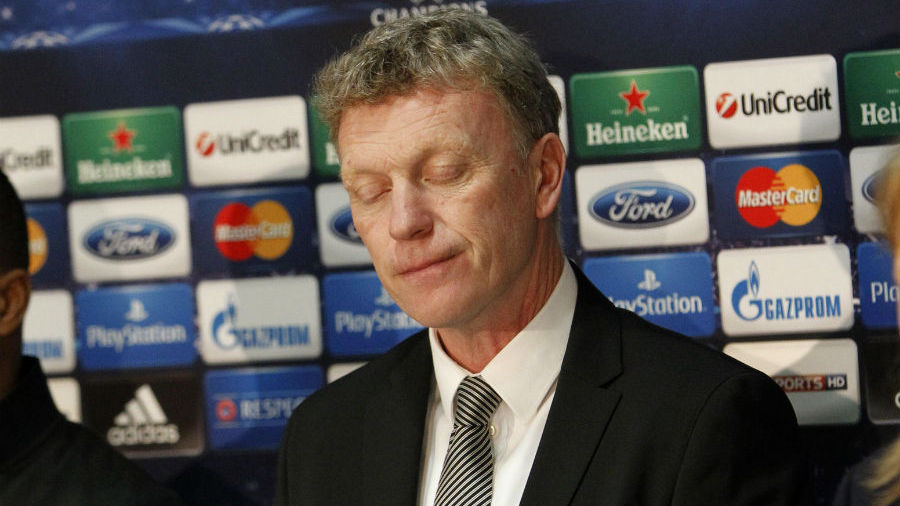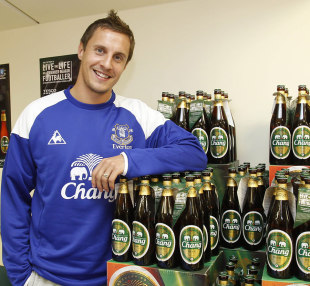- Premier League
David Moyes' self-help secrets

David Moyes' stock among his Manchester United players is likely to have plummeted to a new low when they caught him reading a management self-help guide called Good to Great on the plane back from their insipid 2-0 Champions League defeat to Olympiakos in February.
They would surely have wondered why the manager of the Premier League champions, who was chosen to succeed Sir Alex Ferguson by the great man himself no less, needed such tutoring.
But what they might have found even harder to take was that it appears Moyes didn't even heed most of the advice in the book.
Here are some choice excerpts from Jim Collins' bestseller that Moyes may have missed:
Hiring policy

"When in doubt, don't hire - keep looking. A company should limit its growth based on its ability to attract enough of the right people."
Two words: Marouane Fellaini.
With United needing two world-class central midfielders to come into the club, Moyes was spurned by the likes Thiago Alcantara, Cesc Fabregas and Ander Herrera last summer.
Instead of waiting for the next transfer window, United paid over the odds for Moyes' trusty steed from Everton, with Fellaini proving to be a £27.5 million flop at Old Trafford.
The writing was arguably on the wall for Moyes when it became apparent he couldn't attract top stars to United in last summer's transfer window.
The £37.1 million club-record signing of Juan Mata was an exception, but Mata was desperate for first-team football with the World Cup looming and couldn't get it under Jose Mourinho at Chelsea.
Change for change's sake

"The good-to-great leaders were rigorous, not ruthless, in people decisions. They did not rely on lay-offs and restructuring as a primary strategy for improving performance."
Even until his final few days as United manager, Moyes was hellbent on overhauling United's squad - which had won the Premier League title by 11 points the season before - and was ruthlessly pursuing summer targets in what was set to be a £100 million-plus spending spree.
"Everybody knows that we are on track to make changes and do some different things. We are rebuilding, we have got things we want to do," Moyes said after defeat at Goodison Park.
Then in his parting shot through the LMA, Moyes underlined the fact that he had been committed to the "fundamental rebuilding" of the squad.
Stubbornness

"Alignment principally follows from results and momentum, not the other way around."
Moyes was adamant that the United players do things his way when perhaps he should have resisted the temptation to make sweeping changes to the backroom staff, tactics, training methods and so forth.
Had Moyes come in and kept the players doing what they were used to, he might arguably have been able to bring in his own ideas gradually over time and see them accepted successfully by his squad.
But getting his defenders to reportedly watch videos of his old Everton centre-back Phil Jagielka was simply ludicrous, if true. These players are serial winners - Jagielka doesn't have a trophy to his name.
Leadership

"[Leaders] are resolved to do whatever it takes to make the company great, no matter how big or hard the decisions."
Moyes always sounded as if he was "resolved" as the guide suggests, but the evidence suggests he was misguided in the way he applied his determination. There is certainly no hiding from the fact that Moyes got a lot of decisions wrong at United, particularly when it came to team selection.
He never fielded the same side in any of his 51 games in charge and often pandered to his star players like Wayne Rooney and Robin van Persie, even when they were out of form or injured.
Juan Mata and Shinji Kagawa have been largely deployed out on the wing because Moyes couldn't make the call to drop Rooney or Van Persie when both were fit. Rooney's monstrous new £300,000-a-week contract - and apparent destiny towards captaincy next season - meant Moyes backed himself into a corner.
Discipline

"Good-to-great companies had leaders who built an enduring culture of discipline. Do not confuse a culture of discipline with a tyrant who disciplines - they are very different concepts, one highly functional, the other highly dysfunctional. [Those] who personally discipline through sheer force of personality usually fail to produce sustained results."
Is any of the above more applicable in a negative sense to Moyes than it would have been to Ferguson, his illustrious predecessor?
Maybe not, but the difference between the effectiveness of the two men is interesting. One reason is that Ferguson was given three years before crisis point in 1990, which then turned into a 27-year reign with a back catalogue of crushing player power. Just ask Paul Ince, Jaap Stam, Roy Keane, Ruud van Nistelrooy and David Beckham where their griping got them.
Moyes got until February before the board's confidence in him began to wobble, then the pressures of the modern game began to take hold and he had lost his job even before the anniversary of Ferguson's abdication. Time was never on his side in the same way it was in Ferguson's early years.
The second difference is inconsistency. Ferguson treated everyone the same - no player was bigger than the club, but everyone - particularly youth players - were made to feel welcome and part of things. He was the club's father figure.
Contrast that with Moyes' handling of Danny Welbeck, Tom Cleverley and Ashley Young, who were reprimanded for a night out after their Champions League elimination while other indiscretions were, reportedly, allowed to fly.
Mr. Motivator

"Spending time trying to 'motivate' people is a waste of effort. The real question is not, 'How do we motivate our people?' If you have the right people, they will be self-motivated. The key is not to demotivate them.
Hmm, Moyes looks guilty on both counts. Sunday's 2-0 defeat at Goodison Park was the last straw for him as United manager and his players looked like they simply couldn't be bothered to play for him. It wasn't the first time this season either - that night in Athens in February when Moyes' book came out was another prime example.
Perhaps repeatedly talking about transfer targets and needing to rebuild the squad is not the best way to inspire an underperforming squad of players either!

